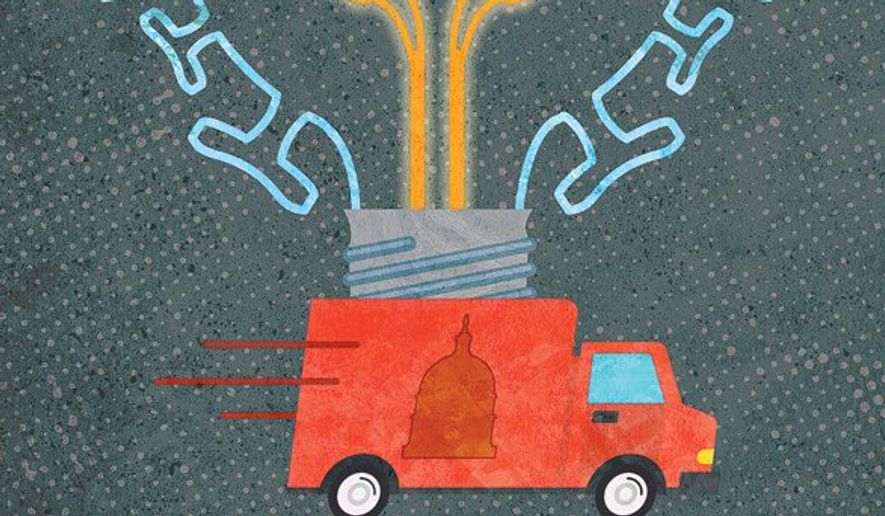OPINION:
In May of this year, the Biden administration announced its support for a proposal at the World Trade Organization that would allow other countries to seize American intellectual property on COVID-19 technologies, including vaccines. On cue, those countries promptly modified their ask. Whereas the original proposal called for the waiver to last a limited number of years, the new proposal makes the waiver effectively permanent. And why not? If America is willing to hand over its crown jewels, it might as well demand to keep them forever.
As a former Director of the U.S. Patent and Trademark Office, I know that America’s world-leading IP protections laid the foundation for our economic success and technological prowess. And as an immigrant from a communist nation, I know all too well how disrespect for private property rights undermines innovation and saps economic vitality.
Since the Founding Fathers, Americans have understood that private property extends well beyond land, buildings, factories, and machines. The real source of America’s power and promise are ideas.
Walls, locks, or guards can protect physical property, but the implementation of ideas — new songs, artificial intelligence, or medicines — requires special protections and trust in the rule of law. That’s why the Founders included intellectual property rights in the Constitution — in the form of an “exclusive right” for authors and inventors — to “promote the progress of science and useful arts.” Indeed, this is the only time the word “right” appears in the Constitution (amendments aside). The Founders knew that only the rule of law, and our respect for it, can protect and enable the development of these ideas.
Yet, President Biden undermined that respect by signaling his support for the appropriation of America’s intangible assets. In doing so, he jeopardized America’s uniquely successful intellectual property system.
The history of our nation — indeed, much of the history of the world — since 1789 has been the revolution in knowledge led by American ingenuity in agriculture, industry, medicine, and information technology. Progress like this does not just happen. Indeed, it didn’t, for the millennia of the entire human history until our nation’s founding a couple of hundred years ago! It’s not a coincidence that the last two centuries of uninterrupted, IP-driven innovation — up to and including the miraculous creation in a record time of the Covid vaccines themselves — began when one nation finally committed itself to protect intangible assets as much as physical property.
The reason is simple: knowledge is cumulative. Every new discovery becomes the basis for new research. The revolutionary mRNA technology behind Pfizer and Moderna’s vaccines is, in fact, an evolutionary iteration of previous — patented — breakthroughs over the last two decades.
Sen. Bernie Sanders, among others, turns up his nose at all this science, history, and progress. Like President Biden, he supports waiving vaccine patents because, he says, “We need a people’s vaccine, not a profit vaccine.”
Ignore for a moment that many companies have agreed to sell their vaccines at non-profit prices for the duration of the pandemic, or that the vaccines are completely free for all patients at pharmacies nationwide, or that the federal government pays $19.50 per Pfizer dose, about $15 per Moderna dose, and $10 for the Johnson & Johnson shot — less than the cost of a pizza for medicines that are saving millions of lives and restoring our economy.
Instead, focus on the fact that intellectual property protections enabled the creation of “people’s vaccines” in the first place. The choice isn’t between cheap vaccines and even cheaper vaccines — it’s between shots that are protected by strong IP laws or no shots at all.
The same goes for every industry. If President Biden doesn’t protect the IP behind new vaccines, investors and inventors will ask, what other technologies are next? Will similar takings be imposed on climate change technologies, for example? Food processing? Essential semiconductor technologies? Companies will scale back investments in medical devices, microchips, energy, and everything in between if they think the U.S. Government might waive IP protection after the fact so that others may copy their inventions with impunity.
Of immediate concern is the need for more treatments for Covid-19, especially as the pandemic keeps raging with new variants. Knowing that their IP may be appropriated as soon as it is developed, private industry — especially start-ups and smaller businesses that depend heavily on outside capital — may not invest the resources necessary to develop these new technologies that are desperately needed right now.
Here’s the reality: remove patents and other forms of intellectual property, and private-sector investment in innovation dries up. The government will then try to step in to fill the gap, inefficiently as always. Like the taking of factories to nationalize industry, this taking of intellectual property is effectively the nationalization of our innovation economy. The result will be the same as in every other socialist regime that nationalized its industries: the kind of poverty, corruption, and misery that my family escaped from decades ago.
American innovation has cured diseases, enabled human flight, led to the development of computers, and made our nation the envy of the world. Waiving intellectual property rights could forfeit it all.
• Andrei Iancu is a partner at Irell & Manella, LLP, a law firm based in Los Angeles, and a senior adviser to the Center for Strategic and International Studies, and co-founder of its Renewing American Innovation project. He served as the Under Secretary of Commerce for Intellectual Property and Director of the U.S. Patent and Trademark Office, a position to which he was confirmed unanimously by the Senate. He was born in Romania during communism and came to the United States as a political refugee in 1981.




Please read our comment policy before commenting.